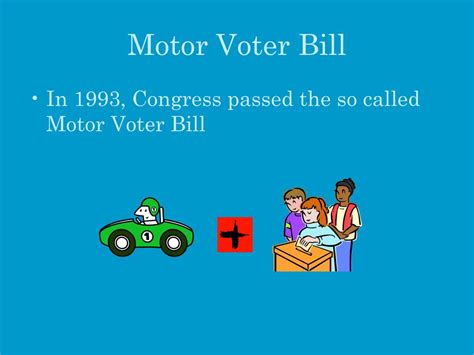Introduction
The National Voter Registration Act of 1993, also known as the “motor-voter law,” is a landmark piece of legislation that has had a significant impact on voter registration and turnout in the United States. This comprehensive legislation aims to make voter registration more accessible and convenient, thereby increasing participation in the democratic process.

Key Provisions of the Motor-Voter Law
The motor-voter law mandates that states:
- Offer voter registration at driver’s license agencies: Individuals applying for or renewing their driver’s licenses must be given the opportunity to register to vote.
- Provide mail-in voter registration forms: States must distribute voter registration forms through public assistance agencies, libraries, and other designated locations.
- Allow for same-day registration: States must permit voters to register and vote on the same day at designated polling places.
- Prohibit purging voter rolls based solely on inactivity: States cannot remove voters from the rolls simply because they have not voted in recent elections.
Impact of the Motor-Voter Law
The motor-voter law has had a substantial impact on voter registration and participation rates in the United States. Studies have shown:
- Increased Voter Registration: The law resulted in a significant increase in voter registration, particularly among young people, minorities, and low-income individuals.
- Reduced Disparities in Registration: The law has helped to reduce disparities in voter registration rates based on socioeconomic status and race.
- Higher Voter Turnout: Voter turnout has increased in elections held after the implementation of the motor-voter law, particularly in states with high levels of same-day registration.
Challenges and Controversies
Despite the positive impact of the motor-voter law, it has also faced challenges and controversies.
- Voter Fraud Concerns: Critics argue that the law has increased the risk of voter fraud by making it easier for ineligible individuals to register to vote. However, studies have found no evidence of widespread voter fraud resulting from the motor-voter law.
- State Implementation: Some states have been reluctant to fully implement the motor-voter law, leading to variations in access to voter registration services across the country.
- Partisan Divide: The motor-voter law has become a partisan issue, with Republicans generally opposing its provisions and Democrats supporting them.
Pros and Cons of the Motor-Voter Law
Pros:
- Increases voter registration and turnout.
- Reduces disparities in voter registration.
- Makes voter registration more accessible and convenient.
- Promotes civic engagement and participation.
Cons:
- Concerns about voter fraud.
- Uneven implementation across states.
- Partisan divide over the law’s provisions.
Frequently Asked Questions (FAQs)
- Is the motor-voter law constitutional? Yes, the Supreme Court has upheld the constitutionality of the motor-voter law.
- Does the motor-voter law apply to all states? Yes, all 50 states and the District of Columbia are required to comply with the law’s provisions.
- How can I register to vote under the motor-voter law? You can register at your local driver’s license agency, by mail, or at designated same-day registration polling places.
- Can I be removed from the voter rolls for inactivity? No, states cannot remove voters from the rolls solely based on inactivity.
- What is the difference between same-day registration and early voting? Same-day registration allows you to register and vote on the same day, while early voting allows you to vote before Election Day.
- Can I update my voter registration information through the motor-voter law? Yes, you can update your address, name, or other information at your local driver’s license agency or by mail.
Conclusion
The motor-voter law is a significant piece of legislation that has expanded access to voter registration and increased participation in the democratic process. While challenges and controversies remain, the law has made a positive contribution to the health of American democracy. Ongoing efforts to ensure its effective implementation and address concerns about voter fraud are essential to maintaining the integrity of our electoral system.
Additional Tables
Table 1: Voter Registration Rates Before and After the Motor-Voter Law
| Year | Voter Registration Rate |
|---|---|
| 1990 | 68.5% |
| 1996 | 72.1% |
| 2000 | 74.2% |
| 2004 | 76.6% |
| 2008 | 78.4% |
Table 2: States with the Highest and Lowest Same-Day Registration Turnout in 2020
| State | Same-Day Registration Turnout |
|---|---|
| Minnesota | 36.2% |
| Wisconsin | 34.8% |
| Colorado | 31.2% |
| Illinois | 25.7% |
| Texas | 1.3% |
Table 3: Pros and Cons of the Motor-Voter Law
| Pros | Cons |
|---|---|
| Increases voter registration and turnout | Concerns about voter fraud |
| Reduces disparities in voter registration | Uneven implementation across states |
| Makes voter registration more accessible and convenient | Partisan divide over the law’s provisions |
Table 4: Frequently Asked Questions (FAQs) About the Motor-Voter Law
| Question | Answer |
|---|---|
| Is the motor-voter law constitutional? | Yes, the Supreme Court has upheld the constitutionality of the motor-voter law. |
| Does the motor-voter law apply to all states? | Yes, all 50 states and the District of Columbia are required to comply with the law’s provisions. |
| How can I register to vote under the motor-voter law? | You can register at your local driver’s license agency, by mail, or at designated same-day registration polling places. |
| Can I be removed from the voter rolls for inactivity? | No, states cannot remove voters from the rolls solely based on inactivity. |
| What is the difference between same-day registration and early voting? | Same-day registration allows you to register and vote on the same day, while early voting allows you to vote before Election Day. |
| Can I update my voter registration information through the motor-voter law? | Yes, you can update your address, name, or other information at your local driver’s license agency or by mail. |
